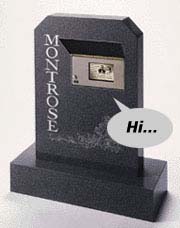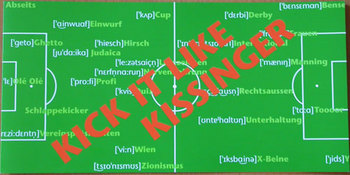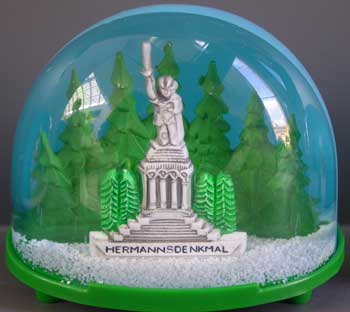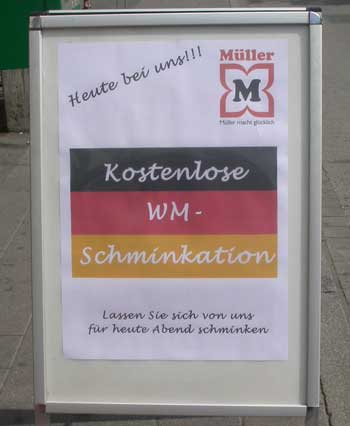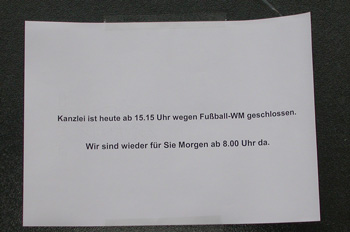
Hanukkah lights
When I mentioned the football exhibition in the last entry, I forgot to say that the film Bend it like Beckham was translated into German as Kick it like Beckham, hence the title of this exhibition: Kick it like Kissinger, rather than Bend it like Bensemann. And Rabbit-Proof Fence appeared here as The Long Way Home. In the old days they would have been called something like Jessica will es endlich wissen and Drei Aborigine-Mädchen gegen die Welt. Either way, it’s often difficult to guess what film is showing.
The catalogue asks whether football can be presented in a museum and says:
bq. Die Frage, ob Fußball überhaupt ausstellbar ist, verweist auf eine besondere Eigenart der Überlieferung im Fußball: Seine Anhänger bilden eine klassische Erinnerungsgemeinschaft. Sie gruppiert sich um gemeinsame Erlebnisse, die überwiegend mündlich tradiert und immer von neuem erzählt werden.
It’s organized as an alphabet: A for Abseits, B for Bensemann, C for Cup. There are recordings, for instance of football crowds chanting and drumming:
bq. Das Fußballstadion ist zur Kathedrale der Neuzeit geworden: Fußballspiele ersetzen für viele die Kirchenbesuche. Dabei weist das Verhalten von Fangemeinschaften starke rituelle Züge auf. … durch Kleidung in den Vereinsfarben, Gesichtsbemalungen, den Genuss von narkotischen Mitteln und Fangesängen. ….Lieder und Rhythmen entstehen meist spontan während der Spiele und werden durch Klatschen und Paukenschlag unterstützt. Dabei treten unbewusst archaische Elemente in Dreitonfiguren auf, die der Kirchenmusík entspringen, sowie Melodien aus der Volks- und der Popmusik wie auch der Klassik. Die aggressiven Gesänge dienen der Unterstützung der eigenen Mannschaft wie auch der Entmutigung und Abschreckung der gegnerischen Mannschaft und ihrer Fans.
There’s a film of the Theresienstadt football game organized by Nazi propagandists for the International Red Cross delegation – all those shown and many others, almost 20,000, were deported to Auschwitz when the delegation left.
One reason Jews played such a big role in the early days of football championships was because they were excluded from the nationalist German Turnvereine (sports clubs). Hirsch died in Auschwitz, Fuchs escaped to Canada. Sindelar (Austria’s greatest player) died in 1939 at the age of 36 in mysterious circumstances. Friedrich Torberg’s poem associates his death with the Third Reich (it was probably suicide – he’d refused offers from teams abroad – and the Gashahn reference is to the carbon monoxide poisoning found):
Es jubelte die Hohe Warte,
der Prater und das Stadion,
wenn er den Gegner lächelnd narrte
und zog ihm flinken Laufs davon –
bis eines Tages ein andrer Gegner
ihm jählings in die Quere trat,
ein fremd und furchtbar überlegener,
vor dem’s nicht Regel gab noch Rat.
… Er war gewohnt zu kombinieren,
und kombinierte manchen Tag.
Sein Überblick ließ ihn erspüren,
daß seine Chance im Gashahn lag.
The whole poem is here. And the exhibition isn’t like that throughout.



